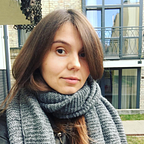November Friend
Today I went to see Hala. She hasn’t changed a little since the last time I’ve seen her. The girl with deep dark brown eyes, a tiny oval face, and thick dark hair tucked under a hat. She wears a fur collar, and every time I see her, it comes in handy. Vilnius weather is not kind in October.
I like our little dates, and yet I’m always nervous, what if I will not find her this time. Once I couldn’t find her for some ten minutes, fearfully looking around, even asked some strangers where I could find her.
She’s just 15, and yet she is nothing like modern teenagers. Her eyes are deeper and smarter, her look is conscious and piercing. Looking at her, I only worry that this brave and bright young person wasn’t ready to be left all along. Only God knows, how lonely she is.
This girl is always silent. She keeps her tiny lips shut, but occasionally you can notice the corners of her lips blur into a slight, modest smile. I can just look at her forever to notice all those small changes in her.
She lives in Vilnius her whole life but speaks only Polish and a little Russian — these two so-called minorities were always wide and powerful in Vilnius. Hala is very well educated, she attended the first female gymnasium named after Eliza Orzeszkowa in Vilnius. That’s a serious and very respectable institution.
Sometimes, I expect that being older now, I could think about her as a child. But something stops me from this.
In her younger years, the world around changed drastically many times. And her future hasn’t promised a relief. And you can see it in her eyes. Nothing is forever, nobody knows what’s coming. When you observe a teenage girl, clearly understanding this, you’d hardly treat her as a kid.
I look at her picture, and I wonder how this photo was made. She’s restrained, not daring to laugh, even if she knew how beautiful was her smile. The smile would be not appropriate on the tombstone, but how could she know that.
I haven’t yet figured what has happened, but in the winter of 1932, Hala died just a couple of days before Christmas.
Her family was wealthy, you can understand it from her tombstone — rare red granite and a sharp photo on a ceramic plate with gilding — technical luxury for that time. Almost 100 years passed, and I can still see every detail of her beautiful face, though the gilding of the frame is already worn out.
On the farther edge of the cemetery by the river Vilnia, Hala Hordynska spends her eternity alone. Closely surrounded by other people who died about the same time, and nameless older tombs ruined during the war. Nobody reserved a place near her. Why did they leave her?
I believe her family could flee away when Germans occupied Vilnius in 1938 or maybe later. They could be back in Poland, which was occupied as well. Or could move somewhere else. One thing is clear, nobody came to visit a girl for a long time. Now, the students of Sirokomles gymnasium take care of the tomb. They bring living flowers twice a year, and other volunteers light a candle on the grave on All Saints day. They don’t know anything about her, and to be honest, neither do I.
It’s just a name, Hala — probably a shortcut from Polish Halina, or Halszka. But apparently, she hasn’t reached the age to be called by the full name. Born in 1917, even before going to school, she lived through the six changes of government in Vilnius (from German to Polish, over independent Lithuanian and Soviet). And then she lived in her peaceful and safe Wilno, attended a gymnasium, had friends, went to one of the numerous churches in the oldtown, read books, walked the narrow streets, surely fell in love, smiled, and cried.
She’s never seen a war. And maybe it’s for the better. And yet, no. Better she would see the war, survive, live a long life. Smile more, and cry more. She would have children, lose her beauty, get old, and, eventually, should die one day. Perhaps, Halina would be buried in a less attractive cemetery, farther from the oldtown, or maybe not even in Vilnius. She wouldn’t be alone there.
Today, we have removed all the dead leaves from the grave, and my candle will burn all night until tomorrow noon. I sat with her for an hour, and I couldn’t force myself to leave. I kept looking at her pretty face. I caught her elusive smiles.
My friend constantly repeats, “So beautiful and young you are.”
“Beautiful is just a moment,” I reply.
And I believe it’s better so.
My Hala is forever young and beautiful. Deprived of the chance to know what follows this moment.
November 1, 2020
Vilnius
